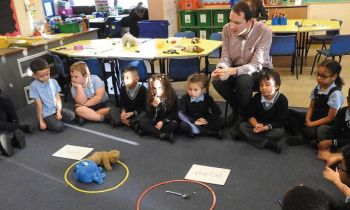Each January, education suppliers eagerly await the latest report on resources spending in schools commissioned and published by the British Educational Suppliers Association (BESA), to help them gauge their activity over the next financial year.
Following a two-year decline in school spending that was starting to deeply affect the market, the 2018 report has brought some relief to the education supply sector with its finding that headteachers are planning to increase their ICT spending in 2018/19. It may be that we’re finally looking at a reverse trend in schools’ resource budgets.
This year’s research was undertaken by the National Educational Research Panel (NERP), and involved 557 primary schools and 366 secondary schools. It seems that after low growth in schools’ resource funding throughout 2015/16, resource budgets contracted in 2016/17 – despite primary school budgets overall expanding by 2.4% in cash terms – down to an average of £35,480 per primary school.
In the short term, this contraction is projected to extend into 2017/18 and amount to an average decrease of 3.5%. Once per-pupil allocations are taken into account, the 2017/18 reductions in per-school resource budgets appear more pronounced. The high pupil numbers recorded by schools result in allocations for each pupil declining by nearly 6% across the primary sector.
What’s more encouraging, however, is that according to the report, school leaders are anticipating a degree of expansion in their resource budgets for 2018/19 – an increase of around 3.2% – reflecting a 2.1% rise in per-pupil allocations.
The same trend appears to be replicated in ICT spending. This expanded in the primary sector by 3.6% in 2015/16, before immediately contracting by the same amount in 2016/17. Taking into account the drop in spending from capital allocations, the indications are that spending on ICT across the primary sector fell by nearly £13 million by 2016/17.
ICT spending is similarly set to contract during 2017/18, marking a further market loss of £15 million – yet primary schools are projected to expand their spending on ICT during 2018/19. That increase will likely be an average of £400 per primary school, and have an overall market impact around +£7 million.
This additional funding will most likely be used to enhance schools’ capacity in networking and for peripheral items, but many schools are also planning to continue spending a significant proportion (over 30%) of their ICT allocation on devices. Indeed, the report finds that more than 40% of primary schools still consider themselves to be insufficiently equipped in terms of the ICT infrastructure and devices they require.
This slight increase in ICT spending is certainly a step in the right direction of ensuring that every child has equal access to digital technologies in their classrooms. According to Caroline Wright, Director General of BESA, “Seeing schools ready to increase their spending on ICT in 2018/19 is an encouraging sign that schools are increasingly recognising the positive impact educational technology has – when applied well – on pupil performance.”
Cleo Fatoorehchi is communications coordinator at BESA.










